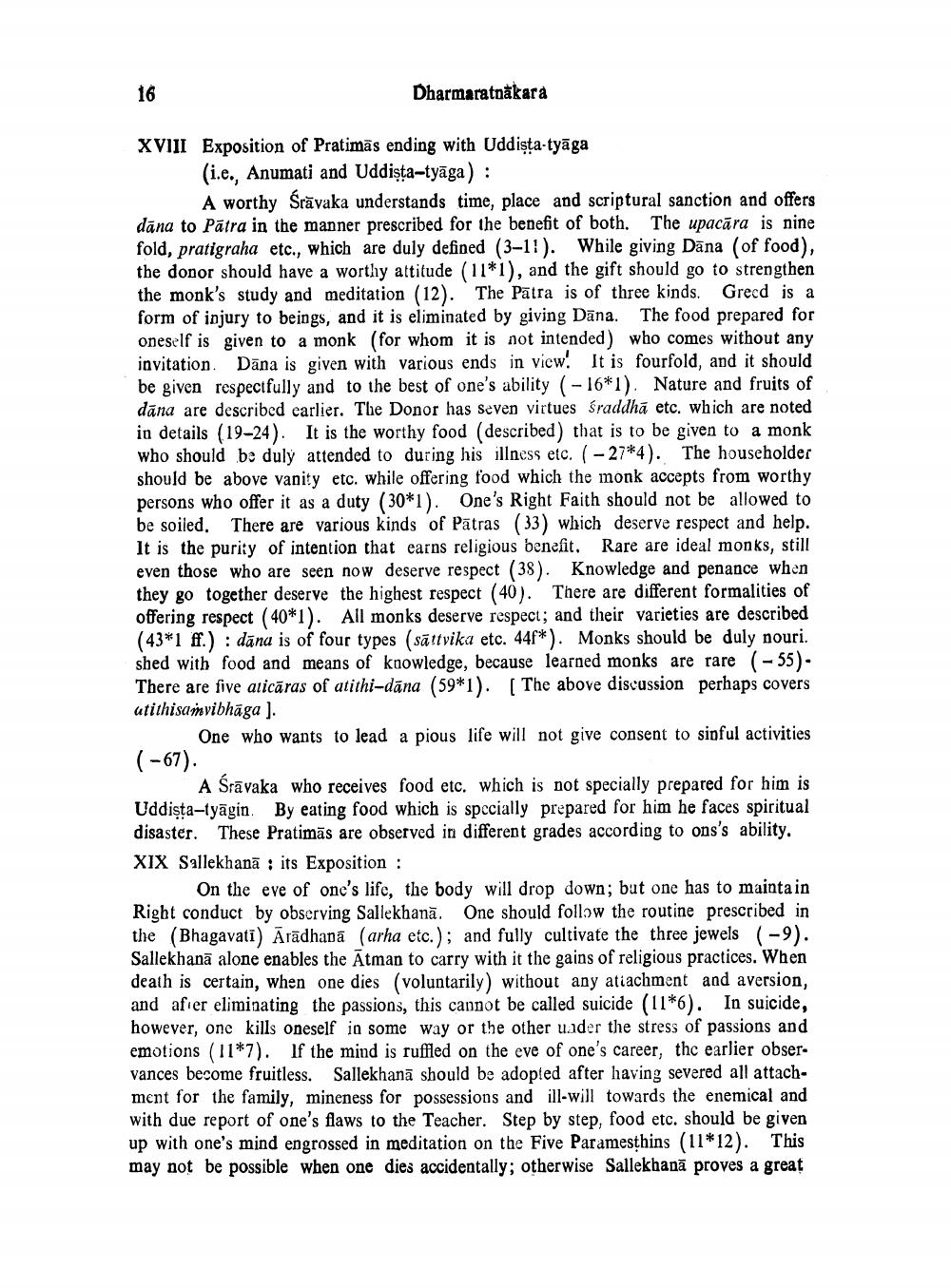________________
16
Dharmaratnakara
XVIII Exposition of Pratimās ending with Uddişta-tyāga
(i.e., Anumati and Uddista–tyāga) :
A worthy Śrāvaka understands time, place and scriptural sanction and offers dāna to Pātra in the manner prescribed for the benefit of both. The upacāra is nine fold, pratigraha etc., which are duly defined (3–11). While giving Dāna (of food), the donor should have a worthy attitude (11*1), and the gift should go to strengthen the monk's study and meditation (12). The Pātra is of three kinds. Grecd is a form of injury to beings, and it is eliminated by giving Dāna. The food prepared for oneself is given to a monk (for whom it is not intended) who comes without any invitation. Dāna is given with various ends in view. It is fourfold, and it should be given respectfully and to the best of one's ability (-16*1). Nature and fruits of dāna are described earlier. The Donor has seven virtues śraddhá etc. which are noted in details (19-24). It is the worthy food (described) that is to be given to a monk who should be duly attended to during his illness etc. (-27*4). The householder should be above vanity etc. while offering food which the monk accepts from worthy persons who offer it as a duty (30*1). One's Right Faith should not be allowed to be soiled. There are various kinds of Pātras (33) which deserve respect and help. It is the purity of intention that earns religious benefit. Rare are ideal monks, still even those who are seen now deserve respect (38). Knowledge and penance when they go together deserve the highest respect (40). There are different formalities of offering respect ( 40*1). All monks deserve respect; and their varieties are described (43*1 ff.) : dāna is of four types (sättvika etc. 448*). Monks should be duly nouri. shed with food and means of knowledge, because learned monks are rare (-55) - There are five aticāras of atithi-dāna (59*1). (The above discussion perhaps covers atithisamvibhāga )
One who wants to lead a pious life will not give consent to sinful activities (-67).
A Srāvaka who receives food etc. which is not specially prepared for him is Uddişta-tyāgin. By eating food which is specially prepared for him he faces spiritual disaster. These Pratimās are observed in different grades according to ons's ability. XIX Sallekhanā : its Exposition :
On the eve of one's life, the body will drop down; but one has to maintain Right conduct by observing Sallekhanā. One should follow the routine prescribed in the (Bhagavati) Ārādhanā (arha etc.); and fully cultivate the three jewels (-9). Sallekhanā alone enables the Ātman to carry with it the gains of religious practices. When death is certain, when one dies (voluntarily) without any atiachment and aversion, and after eliminating the passions, this cannot be called suicide (11*6). In suicide, however, one kills oneself in some way or the other uader the stress of passions and emotions (11*7). If the mind is ruffled on the eve of one's career, the earlier observances become fruitless. Sallekhanā should be adopted after having severed all attachment for the family, mineness for possessions and ill-will towards the enemical and with due report of one's flaws to the Teacher. Step by step, food etc. should be given up with one's mind engrossed in meditation on the Five Paramesthins (11*12). This may not be possible when one dies accidentally; otherwise Sallekhanā proves a great




